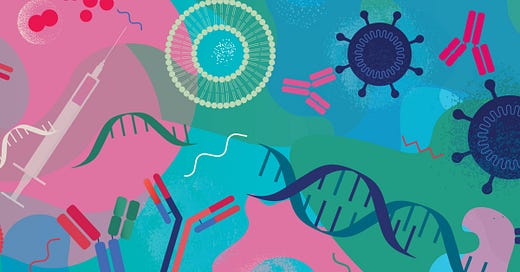N-of-1 Molecular Surveillance & Personalized Peptide Engineering for mRNA Vaccine-Induced Complications
Signal-Based Medicine | mRNA Vaccine Injury and Complications
The discussion around mRNA vaccine injuries—VAIDS (Vaccine-Acquired Immune Deficiency Syndrome), spike protein aberrations, and accelerated oncogenic signaling (“turbo cancer”)—has largely focused on identifying the problem, while viable solutions remain lacking. This is due to an incomplete understanding of the complex, system-wide disruptions these vaccines cause, leading to unforeseen consequences, including an alarming rise in post-vaccine malignancies.
The Core Issue: A Self-Propagating Genetic Disruption
The mRNA vaccine platform is fundamentally flawed, introducing genetic elements that destabilize normal cellular function. This disruption is not limited to spike protein toxicity but extends to:
Immune system collapse (VAIDS and autoimmunity)
Inflammatory dysregulation (chronic immune activation, cytokine imbalances)
Accelerated cancer progression (unregulated oncogenic signaling)
Blood and vascular damage (coagulation issues, endothelial dysfunction)
Genetic instability (DNA repair impairment, transcriptional chaos)
These vaccines have induced a self-assembling and propagating disorder that degrades stable transcription and translation, leading to the widespread dysfunction of critical biological pathways.
Detection: Identifying Molecular Damage
Understanding the full scope of vaccine-induced complications requires precise molecular surveillance to detect patient-specific disruptions. Our analysis of individuals with vaccine injuries has revealed:
RNA Differential Expression Changes – Disruptions in normal gene activation and suppression patterns.
Protein Signaling Errors – Breakdown in protein-to-protein communication, impacting immune regulation, inflammatory control, and cancer suppression.
Oncogenic Pathway Activation – Molecular markers of uncontrolled cancer signaling, correlating with the explosion of post-mRNA vaccine malignancies.
These patient findings confirm that mRNA vaccine injuries are highly individualized, requiring a precision approach tailored to each patient’s unique molecular disturbances.
Solution: Designing and Engineering Personalized Peptide Therapies
A one-size-fits-all approach to treating mRNA vaccine injuries will not work. Each patient presents a distinct molecular profile of dysfunction, demanding a targeted solution.
Neo7Bioscience is at the forefront of designing and engineering personalized peptide therapies to:
Restore immune system balance by modulating abnormal immune signaling pathways.
Stabilize transcription and translation to correct faulty gene expression and protein synthesis.
Counteract oncogenic drivers by suppressing excessive proliferation signals and reactivating tumor suppression mechanisms.
Repair vascular and cellular damage by addressing inflammatory and coagulation dysregulation.
Why Personalized Peptides?
Peptides are highly specific biological messengers that can be engineered to interact with precise molecular targets, correcting dysfunctions at the root cause rather than merely suppressing symptoms. This precision intervention minimizes collateral damage while offering highly effective restoration of normal cellular function.
The Future of Recovery
Recognizing the problem is only the first step—precision remediation through personalized peptide engineering is the path forward. By integrating N-of-1 molecular surveillance with advanced peptide design, we aim not just to halt the damage but actively restore cellular stability, immune function, and genetic integrity.
For those affected by mRNA vaccine complications, personalized intervention is the only viable solution—broad-spectrum treatments will not suffice.
Further Reading:
N1-methylpseudouridylation of mRNA causes +1 ribosomal frameshifting | Nature
Potential health risks of mRNA-based vaccine therapy: A hypothesis - PMC (nih.gov)
Contact: Neo7Bioscience | Contact Us









